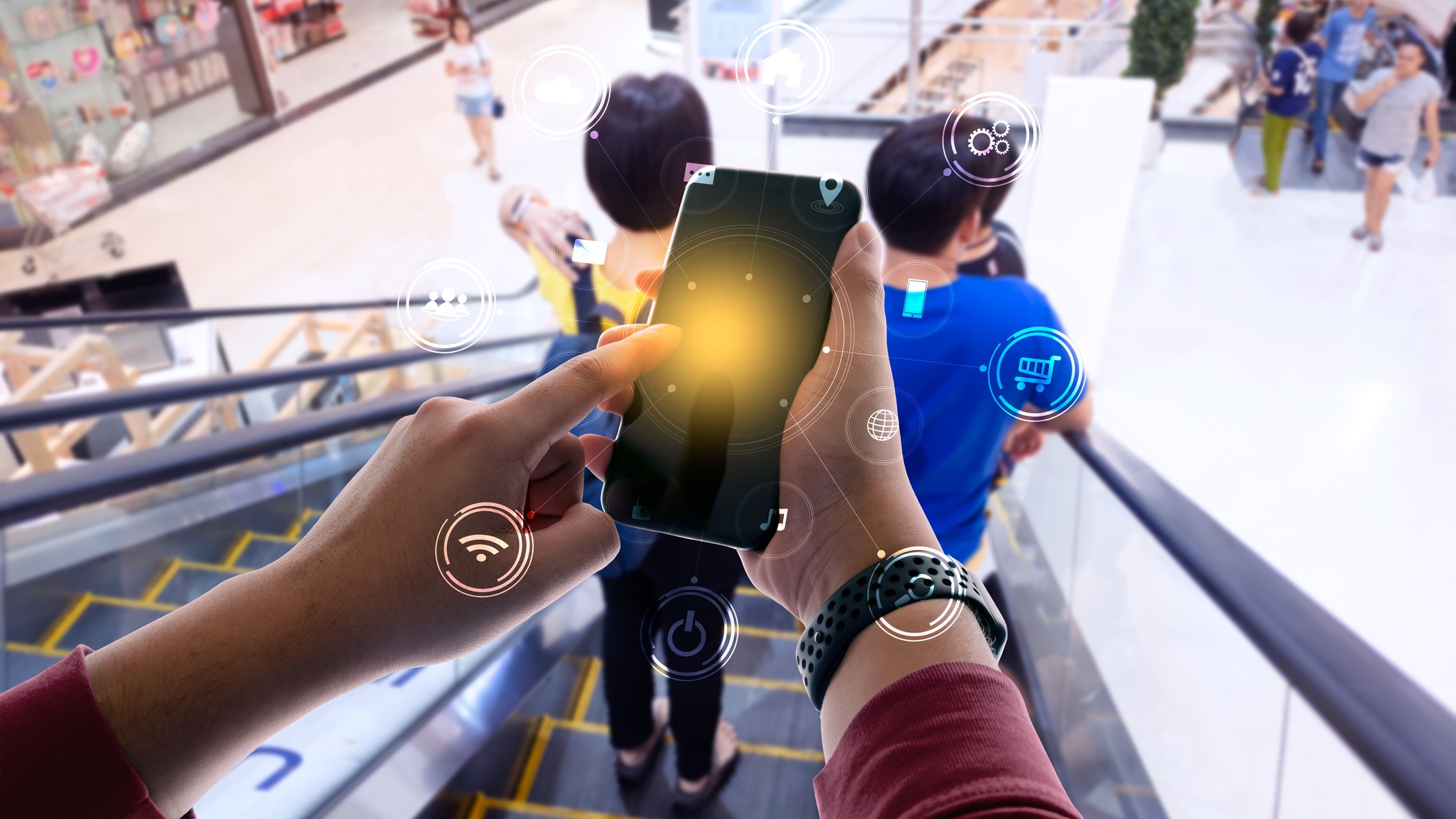What is a Cloud POS system?
As cloud POS systems explode in popularity across retail and hospitality industries, learn what these innovative payment processing systems are and how they can help your business.

TechRadar created this content as part of a paid partnership with Square. The contents of this article are entirely independent and solely reflect the editorial opinion of TechRadar.
With Cloud POS technology evolving at eye-popping speed, consumers continue to be bombarded with a variety of different payment options when they visit retail operations. The invention of some of the best ever cloud POS systems, or web-based point-of-sale systems, allows retailers to provide a variety of payment platforms easily and from the same device, minus the hassle of an old-school cash register.
However, with the sheer variety of options for modern-day cloud POS systems now available it can be a headache for business-owners to understand which option they should choose. TechRadar breaks down the benefits of top-rated cloud-based systems in this article.
TechRadar also notes that a recent study revealed that 50% of consumers globally prefer cloud-based payment methods versus the hassle and inconvenience of carrying cash. This leads to higher customer satisfaction, helps build retention, as well as offering the ability to gather valuable data. Meanwhile, there's the capacity to upsell additional products or services too.
Reader Offer: $0 monthly plan to start
Make every sale quick and easy. Add tools as you need them, or explore our plans to get everything you need at once. Get started for free today.
Preferred partner (What does this mean?)
What is Cloud POS and what are the components of a cloud-based point of sale system?
A cloud POS system is an online point of sale setup that allows business owners the ability to process payments through the internet, rather than using a desktop computer. Cloud-based POS systems let operators store transactions, inventory, employee and other business data on a remote server.
Given that cloud POS systems fall under the SaaS (Software as a Service) umbrella, they often employ a subscription model for business-owners. As an owner, this means you have access to tech support, automatic software updates (a big selling point compared to traditional POS systems), staff training and dedicated account management, plus enhanced encryption security.
This technology provides business owners the opportunity to operate more competently, and effectively for their consumer-base. Transactions are faster, safer, and track more data than ever before.
Are you a pro? Subscribe to our newsletter
Sign up to the TechRadar Pro newsletter to get all the top news, opinion, features and guidance your business needs to succeed!

Cloud POS systems are also capable of running on virtually any device – including a tablet or cell phone. Small businesses such as boutique retail operations, food trucks, mom and pop restaurants, home service providers and so on benefit greatly from these systems as they are more realistically transportable for on-the-job transactions.
That’s not all either – cloud-based POS systems also allow operators to access their point of sale from any location, as well and manage their business remotely. With the advancement of internet technology, most cloud systems rely on a wireless network, so there isn’t a need to physically connect to a land-based server.
By today’s standards, a POS system that is only available on-premise doesn’t cut the mustard.
Pointofsale.com
So, what are the component parts of this savvy modern payment system? Well, it can be made up of hardware and software. A stable touchscreen is needed to serve as the system monitor, allowing consumers to utilize a pen or their fingertip to navigate through the transaction.
Meanwhile, a customizable customer touchscreen display provides the business owner the opportunity to ask customers to sign up for loyalty programs, review their orders, sign receipts and so on. And, of course, a card reader is required to take the payments themselves.
A hard drive is also a necessary component to ensure efficient system operations. Some cloud-based systems have upgraded to SSD (solid state) hard drives, which run more smoothly and efficiently than standard hard drives. A router can be included to allow the business owner the ability to securely send data between various devices. Rounding it out is usually a printer in order to provide hard copies of any necessary documentation such as an itemised bill.
What are the benefits of Cloud POS Systems?

An article by financesonline.com breaks down the significant benefits cloud-based systems have over legacy systems through their retail consulting research. Here is what they discovered: 35% of retailers are already offering personalized rewards based on customer loyalty.
Meanwhile, 23% of retailers plan to offer personalized rewards within 12 months, and another 23% plan to do the same within 1-3 years. For 79% of shoppers, a key consideration when looking for stores to shop is personalized service. With this in mind, let's look at the benefits of cloud-based POS systems and what they empower your business to do:
- Manage your inventory better and reduce human error by storing information as soon as transactions are completed
- Restaurant owners can track sales data from any store at any time
- Eliminate the need for clunky space-consuming computers with handheld devices or small table-top devices
- Save on expensive certification and service fees
- Keep current data as your software will have automatic-updates
- Personalize your promotions and interactions with customers by having access to their shopping preferences
- Easily integrate with e-commerce applications
The benefits of cloud POS systems vs legacy POS systems
An article by ConnectPOS compares the benefits of Cloud POS systems versus traditional on-premise POS systems. Here is what they discovered:
“Cloud POS system has a core benefit when it synchronizes all actual transactions. POS will update automatically all data between online and offline stores at the happening time.
It is extremely beneficial if you operate multi-stores at different locations. For instance, when you sell an item at a specific store, the available amount of that item on that outlet will be changed accordingly. In addition, the level of stock is immediately deducted in the warehouse.”
How much does a cloud POS system cost?

This is always the question-of-the-day when it comes to technology, isn’t it? In our guide to the Best POS systems we advise that business owners will likely only pay once for hardware, then monthly for software use and additional services. Not all providers charge a monthly fee, however, but rather take a percentage from the transaction, such as Square.
We also state that costs have come down in recent years, and the payment screen, card reader and printer can be acquired for the cost of a single terminal – around $600. Naturally, the options vary depending on which components you choose for your business.
Today's top cloud-based POS systems
| POS system | Lowest monthly fee | Card rates | Free trial | Support |
|---|---|---|---|---|
| AirPOS | $29.99 | Integrates with iZettle, SumUp, and WorldPay | 14 days | Online form |
| Lightspeed | $69 | 2.6% + 10¢ | 14 days | 24-hr phone support (reduced weekend hours) |
| Shopify | $29 | 2.7% | 14 days | 24/7 chat support |
| Epos Now | $39 | Integrates with iZettle and others | 30 days | Email support (Pro: 24/7 phone support) |
| Square | $0 | 2.6% + 10¢ | N/A | Phone and chat support |
Which is the best cloud-based system?
Each owner/operator has varying needs, so the best cloud POS system will depend on how it will be utilized. When researching a cloud-based system for your business, consider the following questions:
- What is your budget?
- Which integrations do you need your POS system to be compatible with?
- How experienced you are using POS software?
- What kind of customer data do you want to gather?
- Do you want customizations?
The top-rated systems per industry are:
| Cloud-based POS System | Industry/Use |
|---|---|
| Lightspeed | Large Retailors/Store Management |
| Revel Systems POS | Larger Businesses |
| Square POS | New/Small Businesses |
| Vend POS | Midsize Retailers/Building Customer Loyalty |
| Shopify POS | Omnichannel sales |
As it relates to the overall operator and consumer journey, Square POS tends to be the most highly rated system, stated by fitsmallbusiness.com. With a $0 monthly fee for retail and restaurant owners (a major perk compared to its competitors), this cloud-based POS system has a low card interest rate of 2.6% + $.10 and positive consumer experience.
If you're looking for advice about POS systems for specific type of business, then take a look at TechRadar’s guides to choosing the best POS systems for small business, POS systems for restaurants, and POS systems for retail.
With over 13-years-of-experience in the marketing, public relations and non-profit fields, Erin is a driven copy and content writer, digital designer, strategic planner and public speaker. Throughout the course of her career, Erin has managed multiple teams, bringing sales and marketing success to non-profits and for-profit organizations. She brings empathetic, devoted leadership to the team, drives growth through tactical thinking and a consummate work ethic.

